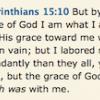Submitter
Follow @BibleSupportSUPPORT TOPIC File Information
- Submitted: Dec 20 2014 01:07 PM
- Last Updated: Dec 22 2021 02:03 PM
- File Size: 19.56MB
- Views: 7104
- Downloads: 977
- Author: Charles Jorgensen
- e-Sword Version: 9.x - 10.x
- Tab Name: PNB-YLT
- Suggest New Tag:: Literal Proper Names Bible
Support BibleSupport.com
-
If our e-Sword and MySword modules have blessed you, please consider a small donation.
Your donation pays only for dedicated server hosting, bandwidth, software licenses, and capital equipment (scanners, OCR equipment, etc).
Other Modules By Same Author
e-Sword 9+ Module Download:
Download
Proper Name Bible YLT 1.0




 6 Votes
6 Votes
Author:
Charles Jorgensen
e-Sword Version:
9.x - 10.x
Tab Name:
PNB-YLT
Suggest New Tag::
Literal Proper Names Bible
When translating scripture the standard practice is to leave names and places in their language of origin. Just as English has proper places with names such as Chicago or Smith, Chicago stays Chicago even though the original Indian word root likely meant “bad smell”. Smith stays a common name rather than its denotative meaning reflecting a blacksmith. This creates a loss of richness for modern Bible readers compared to original language speakers for whom such words carried cultural connotations as well as literal denotations. Such distinctions can become important for readers not fluent in Greek or Hebrew nor native to cultures of the Middle East because rich symbolic allusions that were obvious to the original audience are missing.
The present Bible version grew out of a study that took place in El Paso Texas in the early 1970’s. During one of the lessons, the author was leading a bible study on a battle taking place near the river Jordan. Wishing to present the scriptures in greater depth for his students, he used a standard Strong’s Concordance to locate literal meanings of names and places not all of which were available nor generally agreed upon. To his surprise, he observed when substituted, there were obvious symbolisms showing a battle between good and evil and life and death. He sought to find an all encompassing bible version where the literal names and places were translated in context. Not finding such a source, he began a more extensive series of substitutions and creation of a composite substitution dictionary. The former became a project lasting over 41 years. Below, is a short example that illustrates the effect of such substitution for multiple lines of bible verses. The first are verses from the book of Joshua using a standard King James translation. The second are the same verses with all the proper names and places substituted using literal word meanings highlighted by parentheses.
Original in King James:
Jos 11:1 And it came to pass, when Jabin king of Hazor had heard those things, that he sent to Jobab king of Madon, and to the king of Shimron, and to the king of Achshaph,
Jos 11:2 And to the kings that were on the north of the mountains, and of the plains south of Chinneroth,and in the valley, and in the borders of Dor on the west,
Jos 11:3 And to the Canaanite on the east and on the west, and to the Amorite, and the Hittite, and the Perizzite, and the Jebusite in the mountains, and to the Hivite under Hermon in the land of Mizpeh.
Jos 11:4 And they went out, they and all their hosts with them, much people, even as the sand that is upon the sea shore in multitude, with horses and chariots very many.
Jos 11:5 And when all these kings were met together, they came and pitched together at the waters of Merom, to fight against Israel.
Jos 11:6 And the LORD said unto Joshua, Be not afraid because of them: for tomorrow about this time will I deliver them up all slain before Israel: thou shalt hough their horses, and burn their chariots with fire.
Jos 11:7 So Joshua came, and all the people of war with him, against them by the waters of Merom suddenly; and they fell upon them.
Jos 11:8 And the LORD delivered them into the hand of Israel, who smote them, and chased them unto great Zidon, and unto Misrephothmaim, and unto the valley of Mizpeh eastward; and they smote them, until they left them none remaining.
Substituted from Proper Name Bible:
Jos 11:1 and it came to pass, when (intelligent) king of (village) had heard those things, that he sent to (he will cause crying) king of (strife), and to the king of (guardian), and to the king of (bewitched),
Jos 11:2 and to the kings that were on the north of the mountains, and of the plains south of (harps), and in the valley, and in the borders of (the generation) on the west,
Jos 11:3 and to the (merchant) on the east and on the west, and to the (soothsayers), and the (terror), and the (rurals), and the (trodden down) in the mountains, and to the (wicked) under (devoted) in the land of (a watch tower).
Jos 11:4 and they went out, they and all their hosts with them, much people, even as the sand that is upon the sea shore in multitude, with horses and chariots very many.
Jos 11:5 and when all these kings were met together, they came and pitched together at the waters of (a high place), to fight against (he will rule with god)
Jos 11:6 and the lord said unto (Jehovah is salvation), be not afraid because of them for tomorrow about this time will I deliver them up all slain before (he will rule with god) thou shalt hough their horses, and burn their chariots with fire.
Jos 11:7 so (Jehovah is salvation) came, and all the people of war with him, against them by the waters of (a high place) suddenly; and they fell upon them.
Jos 11:8 and the lord delivered them into the hand of (he will rule with god) who smote them, and chased them unto great (hunting place), and unto (burning waters), and unto the valley of (a watch tower) eastward; and they smote them, until they left them none remaining.
The result of a complete substitution for both the old and new testaments is what I refer to here as a Young’s Literal Proper Name Bible. Such a substitution for the entire Bible exists for two translations: the English standard King James and a the present Young's literal translation. Youngs Literal Translation of the Bible exists in the public domain. I also use Hitchcock's dictionary of proper names as a derivative source rather than my own dictionary which was used for the KJV Proper Name Bible version 1.1 also posted on e-sword. Young's literal version tends to be more naturally readable since original word orders are better preserved and the context is a bit clearer with the substituted meanings. Hitchcock's dictionary provides another translator's choice for the literal word meanings. Another nice example is Jackson's Dictionary of Scripture Proper Names. An e-sword user can compare multiple translation verses quickly to see how particular names might have been chosen using standard references such as Strong's concordance.
This project began in the pre internet age, so obtaining an electronic copy of a Bible and having the processing power to perform mass electronic substitutions proved problematic to put it mildly. It is in itself a story showing the many obstacles principalities and powers can place in front of such an undertaking. Decisions had to be made along the way about how to most reasonably perform mass substitutions including: how to handle multiple shades of meaning, different root language origins such as Babylonian, and disagreements between available reference sources. Compounding the difficulty was how to handle a host of unwanted secondary effects resulting from automation and machine generated errors. For example the word “On” is also a bible name. One can imagine what happens with blind automated verse substitution across megabytes of bible text every time “on” is encountered. In the end, a decision was made to use standard Bible references but also create another single consolidated reference source (also to be placed in e-sword electronic form) from which an automated macro substitution dictionary can be produced. The author’s intent from the beginning is to provide a free, inspirational source for deeper Bible study for as many believers as possible. No claim is made of any perfection in choosing proper name shades of meaning or that some more appropriate choice may be preferred by different scholars or in a context of certain verses. Ideally, this work will provide inspiration to bible scholars to produce increasingly refined substitutions. Recent advances in information technology and electronic study aids such as e-Sword can dramatically improve the ability of others to provide a continually updated resource for students in an easy to use and comparative format. They have most certainly made huge differences in the speed of applying global changes and substitutions for this version for which the current author is most grateful.
Reading from a literal transliteration proves to be a rewarding experience, an appreciation for which increases as more text is read and a sense of the Bible rhythm and emerging imagery grows. Formerly long, boring genealogies become almost poetic. Surprising new characters emerge and take on additional story importance such as the “little brother” and “drawn out”. Stories with both literal and important symbolic meanings become much more obvious.
One interesting result is that the relationships between old and new testament events become more obvious. For example, the meaning of the name David in the old testament is “Beloved”. Jesus is often referred to in the new testament as the promised Son of David. When Jesus is baptized by John a voice from heaven says “This is my Beloved son”. Which combined with the original proper name from the old testament, is also saying to early Hebrew listeners that “this is my “David” son” i.e. the promised son of David. Similarly, in the old testament it says the temple of Solomon was built on mount Moriah which means “Chosen of the Lord”. So the very bedrock foundation of God’s old testament temple is shown to be the “Chosen of the Lord”, the holy one and Messiah of the new testament.
There are too many similar examples to detail in this introduction. The insights to be gained are significant, and hopefully inspiring for Bible readers as they study their favorite passages and bible stories. Ambiguity about shades of meaning do exist for many names of course and can lead to some confusing passages. Future scholarship will undoubtedly change some of the choices which have been made as new information becomes available. In a way, such substitutions are like a jigsaw puzzle. The context of verses can make clear which possible shade of meaning is likely correct. To minimize confusion in these versions, I have usually selected only one per word which is consistently used throughout. The reader is certainly encouraged to disagree and substitute a another shade of meaning from other references available in e-sword. More modern proper name translation dictionaries are appearing all the time which can serve to correct any unintentional mis-substitutions or uncaught errors. It is the author’s sincere hope however, that the current work inspires such future improvements and is a motivational tool for deeper study and insights into the holy scripture. It is provided with the only restriction that the source of any quotes or usage be credited and that it remains an open source document it to be freely distributed to aid in a better appreciation of God’s word and may not be used for any personal profit.
Dr. Charles Jorgensen
Sedona Arizona
Proper Name Bible Youngs LIteral Version 1.0 with Hitchcock Dictionary meanings
Copyright © 2014
What's New in Version 1.0 (See full changelog)
- Uploaded Mac/e-sword 11 version.
Thanks for your efforts on this project! Few people seem to grasp the importance of knowing the meaning of proper names used in the Scripture. I have found that the verb form of the name is often the better choice to use because it is the action of the individual that reveals the greater insight. Thanks again for your work!
Thanks for your efforts on this project! Few people seem to grasp the importance of knowing the meaning of proper names used in the Scripture. I have found that the verb form of the name is often the better choice to use because it is the action of the individual that reveals the greater insight. Thanks again for your work!
What is the evidence you have to be able to make this claim?
This is a most excellent work. The knowledge and wisdom gained from knowing translated names cannot be estimated.
Mr. Jorgensen there is one thing, if incorporated in your work, that will make it complete. It is the form, used in many works, of transliterating names followed by their literal translation in parenthesis. Doesn't this seem to be the obvious course?
When I read your version I feel unsure what all words are part of a name and who is being named.
Chandler 1Pet. 3:21
I had a good look at this work, and I have to admit I found it really difficult to go through. The reasons are as follows:
- That without the actual name, the rendering of what the name means on its own makes it nonsensical. It would be better served if the actual name was included, and then the rendering of that name
- With just the renderings on their own, contributed the sentences being drawn out and long winded, and made reading to be boring and tedious
- The lack of flow in the text made it to be difficult to be able to read.
If it, at bottom line, included the actual name of the person(s), then I would have given it at least three stars. As it is in its current format, I find it extremely difficult to give it 1 star.. I'm sorry to have to says this, but this resources really needs a thorough revamp of the format.
Blessings,
May YAH bless you for sharing this wonderful resource! Thank you!
Your work reminds me of the Introduction to Ancient Hebrew playlist, accessed via Jeff Benner's website, on his video teachings link, found on the right-hand side of the home page of his website, ancient-hebrewDOTorg. In fact, a few of his works are here on this site as free modules. I encourage you to take a look at that playlist because as I tested my installation of your Proper Names Bible to see if it worked in my installation of e-Sword, I read Deut. 1:1, only to be reminded of what I learned from Jeff Benner. Namely, the ancient Hebrew language is one of concrete (tangible) thought, not abstract (intangible) ideas popular among Greco-Roman influences.
Your Proper Names Bible 1.0 is spot on! I find it refreshing to read the words of what the people where thinking, in their own culture, society, etc. It is a breath of fresh air, away from the stench of religious material that takes what is set apart, and "converts" it into the mindset of the current common culture. We are not to be conformed to this world, but the majority of truth seekers think nothing wrong with putting YAH in their box when He clearly told us to be transformed by the renewing of our mind. So we must put off the old man, and put on the new man, which has its fundamental thought patterns in Hebrew from Aleph to Tav. And this is clearly confirmed in the truth of Scripture where it reads, "I am the Aleph (first) Tav (and the last), the beginning and the end." Take a look for yourself at the Aleph Tav Hebrew letters in the Masorectic text beginning with Genesis 1:1. Then ask yourself, if there is a Strong's number for this Hebrew word, why was it not translated into English? I thank YAH for your work!
Nice job!
Shalom
Other files you may be interested in ..
- 8,224 Total Files
- 50 Total Categories
- 275 Total Contributors
- 5,882,368 Total Downloads
- French David Martin , KJB Latest File
- PeanutGallery Latest Submitter
75 user(s) are online (in the past 30 minutes)
3 members, 65 guests, 0 anonymous users
billhuff1956, Guleng, Facebook (5), Bing (2), Katoog




















Sorry, what is the point. So confusing.